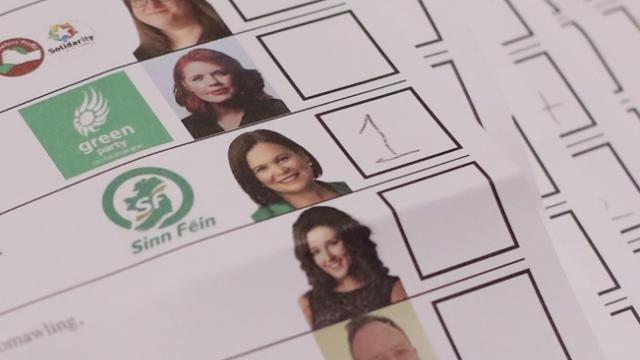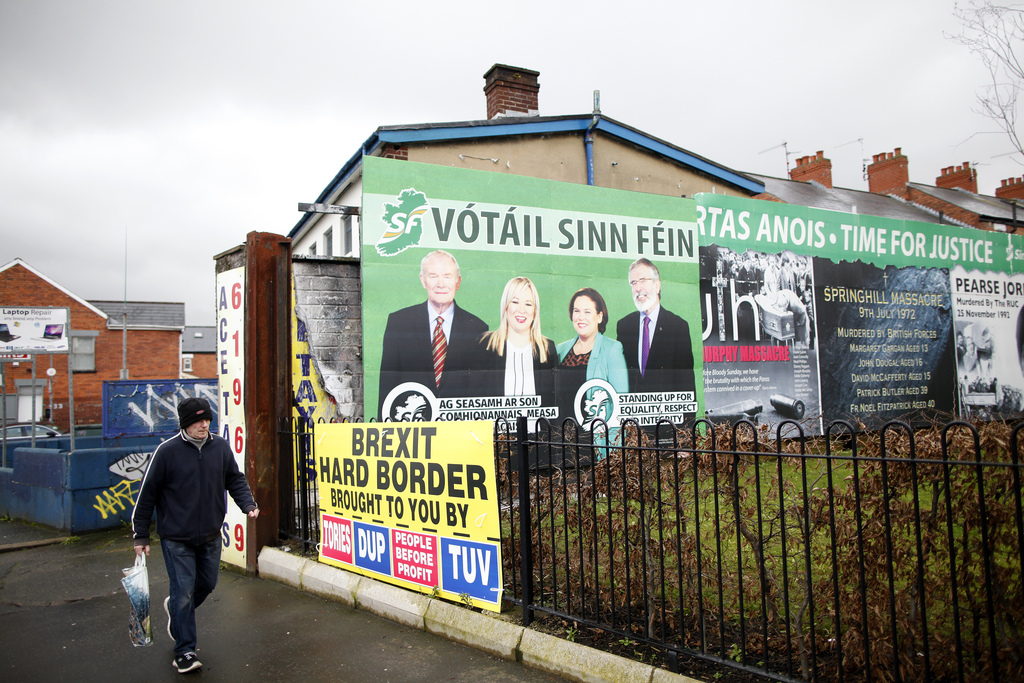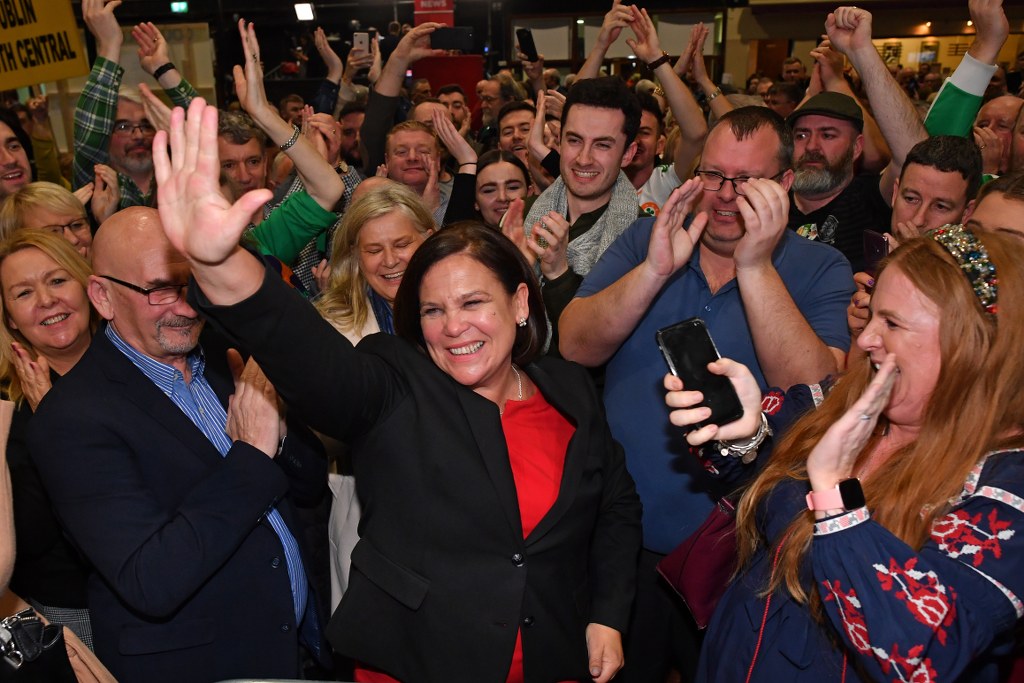
Just weeks after Spain’s left-leaning community celebrated their country's vote in favor of a socialist revival, leftists in Ireland are rejoicing as well as, with outsiders Sinn Féin stealing the show in the country’s general election earlier this month.
The win marked a heartening contrast to "Brexit Britain" and the international lurch to the far-right.
Breaking the century-long dominance of heavyweight center-right parties Fine Gael and Fianna Fáil, Sinn Féin took 37 seats after winning 24.5 percent of the first-preference vote, almost doubling its share of votes from the 2016 general election.
Prior to the election, both Fianna Fáil and Fine Gael, which took 22 percent and 21 percent of the vote, respectively, ruled out forming a coalition with Sinn Féin, citing its Irish Republican Army past and tax policies as principle deterrents.
Sinn Féin’s win was described by party leader Mary Lou McDonald as “something of a revolution in the ballot box.” Following the party's historic surge in popularity at the polls, which marks a seismic break from the nation’s well-worn two-party system, Sinn Féin is now holding talks with the Greens, Social Democrats and other potential left-wing parties to try to form a ruling coalition.
Beyond a stunning victory for Sinn Féin and a historical repositioning of the Republic of Ireland’s political landscape, the win is testament to how, amid growing hostility towards fraying public services, far-right rhetoric and crippling inequality, voters are putting their faith in left-wing outsiders and the promise of bold social reform, as outlined in Sinn Féin’s manifesto.
Ending long-term homelessness
Homelessness in Ireland is on the rise, something Sinn Féin pledged to address. According to the homeless charity Focus Ireland, the number of homeless families in the country has increased by 280 percent since December 2014.
Citing the country’s broken housing system as a root cause of the homeless crisis, Focus Ireland said the “provision of public housing must form a key part of any country’s housing system.”
Ending homelessness is a priority for Sinn Féin. Its manifesto states that by working in collaboration with homeless charities and local authorities, it will eventually end long-term homelessness. The party promises what it refers to as the “biggest public housing programme in this states’ history.”
The ambitious housing reform focuses on making renting more affordable by reducing rents up to 1,500 euros a year via a refundable tax credit, and by putting a freeze on rent for three years.
Over the next five years, the party plans to build 100,000 new homes, including council housing and affordable home for first-time buyers and renters.
In a further drive to make homes more affordable in Ireland, Sinn Féin’s manifesto pledges to provide the Central Bank with powers to cap interest rates on mortgages.
Reducing the cost of childcare is another priority for the party, which promises to decrease childcare costs by 500 euros a month. Sinn Féin has also said it will scrap fees for third-level education and abolish Universal Social Change on the first 30,000 euros earned.
Those earning under 100,000 a year will see their tax bill decrease by up to 700 euros a year.
The party says it will raise the money needed to make the social reforms by imposing greater tax on banks, multinational corporations and those individuals earning more than 100,000 euros a year.
Stamping out inequality
Fueling discontent over Ireland’s growing social inequality and what’s been labelled the worst housing crisis in the nation’s history are the deteriorating living standards for many people, accompanied by extreme wealth concentration in the hands of a few individuals.
A study by Oxfam showed the Republic of Ireland has the fifth largest number of billionaires relative to its population. Growing resentment against inequality and declining living standards struck a chord with voters and contributed to Sinn Féin’s historic win in the February election.
Talking to Occupy.com, David Cronin, an Irish journalist specialising in European politics and political activism, spoke about Ireland’s worsening homelessness and Sinn Féin’s credible housing reform plans. Cronin said he was pleased with the party's breakthrough in the general election – a victory that showed that the duopoly of power, based on two parties dominating Irish politics for decades, is over.
“Both these parties – Fianna Fáil and Fine Gael – emerged from a civil war almost 100 years ago and have long been almost identical from an ideological perspective," Cronin said. "Both have been craven to big business interests. To please property speculators, landlords and vulture firms, they have allowed a housing crisis to develop and worsen.
"At least 10,000 people are homeless in Ireland and there are God knows how many more in a state of hidden homelessness. Among them are young people having to live with their parents for ages because rents are prohibitive, especially in Dublin," he added.
“For a country the size of Ireland, that is a scandal. Sinn Féin’s housing spokesperson Eoin Ó Broin is one of Ireland's most impressive politicians. He has presented very credible plans to end the housing crisis based on the large-scale provision of social and affordable housing. His proposals have clearly resonated with people who are literally sick of the status quo,” Cronin said.
The changing face of Sinn Féin
For many, the mention of Sinn Féin evokes images of The Troubles and the party’s leader of 34 years, Gerry Adams, who remains one of the most recognisable and controversial figures in Irish politics. Today’s Sinn Féin is markedly different from the political pariah the party was for decades due to its former IRA associations.
For starters, Ireland’s younger voters have no personal memory of The Troubles and Sinn Féin’s past. More broadly, Sinn Féin has reinvented itself as the party of the progressive left.
As the Irish Labour Party supported austerity measures introduced by Fine Gael, which it was in coalition with from 2011 to 2016, Sinn Féin became a leading anti-austerity voice. The party is also a key driver on social issues, including reforming laws related to abortion and equal marriage.
Contrasting to its former opposition to European integration, Sinn Féin now identifies itself as “critical but supportive of the EU,” fighting for a united Ireland within a reformed European Union.
The party’s new leader, McDonald, has breathed fresh life into a notably reformed Sinn Féin. In February 2018, she succeeded Adams as the party’s head. The middle-class, well educated 50-year-old from an affluent suburb of Dublin presents a different image from the generation of leaders who took the IRA into the peace agreement.
When stepping up as leader, McDonald promised to broaden the electoral appeal of the party. Though the party quickly dropped council seats in the 2019 local elections, Sinn Féin’s emphatic surge in popularity in the 2020 general election is evidence that McDonald – and a party led by progressive left-wing values and policies – is resonating with the wider electorate.
Freda Mullin Hughes – chairperson at Blanchardstown Traveller Development Group, editor of a trade union magazine, and an anti-fascism and anti-racism activist – told Occupy.com that Sinn Féin’s victory is an example of Ireland “bucking the trend” on international far-right dominance.
“Sinn Féin have been strong in countering the far-right rhetoric that's emerged lately. People had the option to vote nationalist whereas the vote for Sinn Féin was a vote for change and a vote for republicanism," said Hughes. "They were part of the #transferleft campaign and had already discussed a left-wing alliance before election day."
“Their massive rise this time around was actually an example of Ireland bucking the trend of countries moving towards the far right internationally, and that is something I’m very happy about," she added. “I'm extremely proud to see so many people that I've worked with on anti-racism, Palestinian and Travellers rights campaigns over many years elected.
"These comrades from Sinn Féin, Solidarity/People Before Profit, the Social Democrats and even a few of the Greens have been committed to social justice and building strong anti-racist communities for many years as committed grassroots and community activists. I really hope we will soon see a broad left coalition led by Sinn Féin.”
As discussions continue between the party and potential partners about forming a ruling left-wing coalition, Sinn Féin's success in the recent general showed that voters’ concerns about social justice and equality outweighed the party’s past associations. And like their western European neighbors Portugal and Spain, which are leading a socialist revival, there’s life in the Irish left yet.













